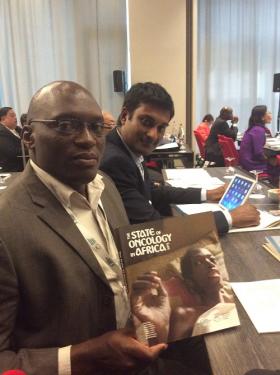Call to Action for Cancer in Africa
Tuesday, 9 August 2016

IAPO board member, Joshua Wamboga, participated in the National Cancer Institute’s Directors Meeting in Lyon, France in July 2016, held by the International Prevention Research Institute (iPRI) and Institute of Global Public Health. The event brought together over 100 directors of national cancer institutes from WHO Africa, WHO Eastern Mediterranean and WHO South East Asia regions, in order to discuss the state of oncology in Africa.
Following the launch of 'The State of Oncology in Africa' report at the meeting, the iPRI is now calling on African governments, foreign governments and international organizations to address the challenge posed by Cancer in Africa with specific, coordinated actions. This is your opportunity to pledge your support to the following calls to action:
- There is a need to train more oncologists and health professionals in cancer care and provide the necessary infrastructure which is urgently needed to identify and treat patients. More general and specialist surgical capacity is critical as are concomitant enhancements in imaging and pathology.
- The drugs and equipment necessary to treat patients with cancer must be made available. As a minimum, each country should ensure the supply of all cancer drugs on the WHO Essential Medicines List. We need to deliver, install and maintain adequate numbers of resource appropriate Radiotherapy machines. It should be the right of cancer patients, no matter where they are to have access to the appropriate treatment of their disease.
- Opioids must be available for controlling the pain of patients with terminal cancers (and other diseases). International Agencies should make this a priority activity and come to agreements with Governments of countries where these are not available.
- Since half of cancer in Africa is currently caused by chronic infection, relevant infection control and vaccination programmes must be funded and implemented continent-wide.
- Information and education campaigns to wipe out stigma and misinformation must be conceived and disseminated.
- Making Universal Health Coverage globally available and strengthening health systems is critical for improving cancer care. This is also a critical area for the corporate and social responsibility agendas for the private industries including all trans-African corporations.
- High quality cancer institutions, all over the world, should establish collaboration ventures with cancer centres and institutes in every African country, as well as with public health services.
- International philanthropy is vital to help fund these efforts.
- The United Nations International Covenant on Economic Social and Cultural Rights (ICESCR) should be invoked as the basis for action. This multilateral treaty provides that State Parties to the Covenant recognize the right of everyone to the enjoyment of the highest attainable standards of physical and mental health. Article 12.2 contains important determinants of the right to health such as prevention and treatment of diseases essential for the enjoyment of the right.
More details:
